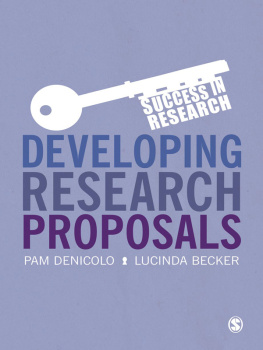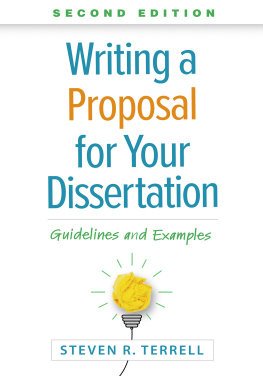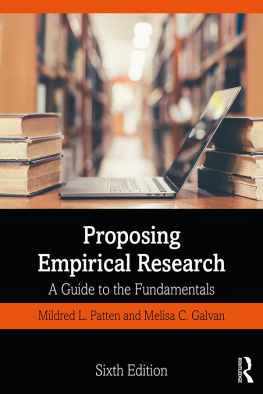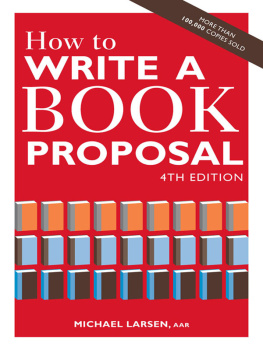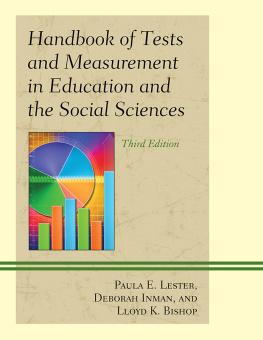SAGE Publications Ltd
1 Olivers Yard
55 City Road
London EC1Y 1SP
SAGE Publications Inc.
2455 Teller Road
Thousand Oaks, California 91320
SAGE Publications India Pvt Ltd
B 1/I 1 Mohan Cooperative Industrial Area
Mathura Road
New Delhi 110 044
SAGE Publications Asia-Pacific Pte Ltd
3 Church Street
#10-04 Samsung Hub
Singapore 049483
Keith F Punch 2016
Chapter 3 Alis Oancea 2016
First edn 2000; second edn 2006
Apart from any fair dealing for the purposes of research or private study, or criticism or review, as permitted under the Copyright, Designs and Patents Act, 1988, this publication may be reproduced, stored or transmitted in any form, or by any means, only with the prior permission in writing of the publishers, or in the case of reprographic reproduction, in accordance with the terms of licences issued by the Copyright Licensing Agency. Enquiries concerning reproduction outside those terms should be sent to the publishers.
Library of Congress Control Number: 2015950624
British Library Cataloguing in Publication data
A catalogue record for this book is available from the British Library
ISBN 978-1-4739-1637-1
ISBN 978-1-4739-1638-8 (pbk)
Editor: Mila Steele
Editorial assistant: Alysha Owen
Production editor: Ian Antcliff
Marketing manager: Sally Ransom
Cover design: Shaun Mercier
Typeset by: C&M Digitals (P) Ltd, Chennai, India
Printed and bound by CPI Group (UK) Ltd, Croydon, CR0 4YY
1.1. Research proposals purpose and use of this book
The research proposal is a central feature of the research world. Typically, the presentation and approval of a formal proposal is required before a piece of research can proceed.
This applies to the graduate student in a university, for whom the research dissertation (or thesis) lies ahead, and for whom the approval of a research proposal is required in order to proceed with the dissertation. It applies also to the application for funds to support research, where the proposal is the vehicle by which the proposed research is assessed, and decisions are made about its funding.
This book is mainly written for the graduate student in the university, but I hope it will also be useful for other situations where proposals are required. Its central purpose is to help students develop research proposals, assuming that the research involved is empirical research in some area of social science. The idea of empirical research is discussed in .
To achieve its purpose, the book is organized around three central themes:
- What is a research proposal, who reads proposals and why ()?
- How can we go about developing a proposal? What general guidelines and strategies are there to help students, while recognising at the same time that the wide variety of social science research implies that we should not try to be too prescriptive or restrictive about this? This theme is subdivided into a general framework for developing proposals ().
- What might a finished proposal look like ()?
By way of introduction, I suggest a four Ps view of the proposal phase, process, product, plan:
- The research proposal is a phase of the overall research process the phase which launches the project, and therefore a very important first phase.
- Developing a research proposal is a process of planning, designing and setting up the research, including placing it in context and connecting it to relevant literature.
- The finished proposal is a product, where the proposal is formally presented as a document.
- That document contains the proposed plan for the execution of the research.
This description of the proposal suggests different ways you might read and use this book, choosing the chapters according to your interests and needs. For example, . If you want an overview of all of this, you might read the chapters in the order presented.
gives more detail about the chapter plan for the book. The remainder of this chapter now gives some background to it.
1.2 Background to this book
1.2.1 Empirical research data
Our subject is empirical social science research, and developing proposals for doing such research. Empiricism is a philosophical term to describe the epistemological theory that regards experience as the foundation or source of knowledge (Aspin, 1995: 21). Since experience refers here to what is received through the senses, to sense-data or to what can be observed, I will use the general term observation alongside the term experience. Thus empirical means based on direct experience or observation of the world. To say that a question is an empirical question is to say that we will answer it or try to answer it by obtaining direct, observable information from the world, rather than, for example, by theorising, or by reasoning, or by arguing from first principles. The key concept here is observable information about (some aspect of) the world. The term used in research for this observable information about the world, or direct experience of the world, is data. The essential idea in empirical research is to use observable data as the way of answering questions, and of developing and testing ideas.
Empirical research is the main type of research in present-day social science, but it is not the only type. Examples of other types of research are theoretical research, analytical research, conceptual-philosophical research and historical research. This book concentrates on empirical research. At the same time, I believe many of the points it makes about proposal development can be applied to other types of research.
BOX 1.1
Types of research
Empirical research rests on empirical questions questions which are answered using data. But there are other types of questions. One type is analytic. By this we mean that an analytic question can be answered by analysis of the question itself. An empirical question requires empirical evidence that is, data in order to answer it. An analytic question, by contrast, can be answered by analysis of the question itself, without recourse to real-world data.
The nature of empirical questions is not hard to understand, partly because the scientific method, which is based on empiricism, saturates the modern (Western) world, so that empirical questions are everywhere. The nature of analytic questions can be harder to understand. Because they involve the analysis of concepts and propositions themselves the analysis is sometimes called analysis from first principles.
More generally, concepts, propositions and theories can be analysed, without necessarily involving empirical data, focussing on such things as their definitions, properties, implications and internal consistency. This is what is meant by such terms as analytical research, research from first principles, and theoretical and conceptual research. The point stressed here is that, while these types of research have their importance, they are different from empirical research.


